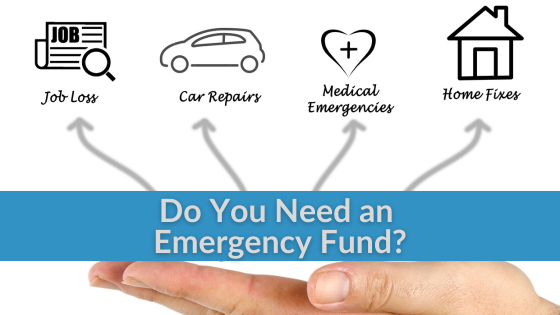You’ve likely encountered at least one, and probably more, unexpected financial hits. A broken HVAC unit. A surprise medical bill. A fender bender. Maybe even a sudden loss of income. These moments have one thing in common: they occur without warning, often at the worst possible time.

One of The 6 Money Decisions® is Protect, and building an emergency fund is a foundational way to do just that. Whether you’re leading a team, building a business, or managing a demanding career, having a dedicated savings cushion is essential to protecting your financial plan from the unexpected.
Even a modest fund can help you recover from a surprise expense without derailing your long-term goals.
Think of it as your personal shock absorber. An emergency fund is a separate, liquid savings account set aside for significant, unexpected expenses – things like major car repairs, home maintenance issues, temporary loss of income, or unplanned healthcare costs.
The goal? Avoid taking on debt just to deal with life's curveballs.
A common misconception among high earners is that a robust salary means you don’t need an emergency fund. However, the reality is that the more complex your finances, the more essential this safety net becomes.
Here are six reasons even high-income professionals should prioritize one:
A higher salary doesn’t make you immune to financial surprises. A flooded basement or a surprise out-of-network medical bill can be a hassle, regardless of how much you earn.
Executives, business owners, and specialists can face sudden employment shifts, restructuring, buyouts, or leadership transitions. When your income halts or slows, you’ll be glad to have a financial buffer.
If an injury or health issue prevents you from working, short-term disability insurance might not fully cover your income. An emergency fund helps you manage expenses without draining long-term investments.
High-income-earners are more likely to encounter legal costs, whether from professional liability, contract disputes, or other unexpected scenarios. Access to immediate funds can be a game-changer when time matters.
It’s hard to overstate the mental benefit. Knowing you can handle a surprise without scrambling for a loan or racking up credit card debt creates peace of mind, even if you never need to touch the account.
During downturns or market instability, even top-tier professionals can experience reduced income, contract renegotiations, or lost revenue. Your emergency fund buys you time to adjust without making hasty decisions.
That’s great, but savings without a purpose can become blurred across multiple goals. An emergency fund should be clearly defined and kept separate. This way, you’re not dipping into your travel fund or long-term portfolio when life throws a curveball.
Even if you feel financially secure, it’s still wise to have cash on hand that is easily accessible, not invested, and not earmarked for any other purpose.
Ultimately, the decision to have an emergency fund should be based on your personal financial situation and priorities.
There’s no one-size-fits-all answer, but a good rule of thumb is to aim for three to six months of essential living expenses. This includes:
Start by calculating your actual monthly expenses, not your total income or discretionary spending. Multiply that number by three to get your initial target. From there, adjust based on your risk tolerance, job stability, and family situation.
Here are a few best practices for building and managing your emergency fund:
Our financial planners help high-income professionals define what an emergency fund entails, tailored to their lifestyle, goals, and career stage. We’ll walk you through how much to save, where to keep it, and how it fits into your broader financial strategy.
Bottom line: A strong emergency fund is not about fear; it’s about confidence. It’s about making sure you’re financially prepared to handle what’s next, whatever that may be.
CRN202804-8506055

Joannah Long is the Director of Marketing at Spaugh Dameron Tenny, where she leads marketing strategy, content development, branding, and client communication. With experience in financial services, nonprofit leadership, and consumer marketing, Joannah provides a seasoned, relationship-driven approach to building trust with executives, physicians, dentists, retirees, and high-net-worth professionals. She focuses on creating clear, consistent messaging that aligns with the firm’s mission of providing comprehensive, personalized financial planning.
At Spaugh Dameron Tenny, part of our role is helping clients start each year grounded in facts, not headlines, assumptions, or half-answers. When ...
Read More →After more than two decades helping families across the country, I’ve learned something surprising: Even highly successful people don’t always know ...
Read More →One of the challenges of being in a high-earning profession — whether in healthcare, business leadership, or another demanding field — is making ...
Read More →